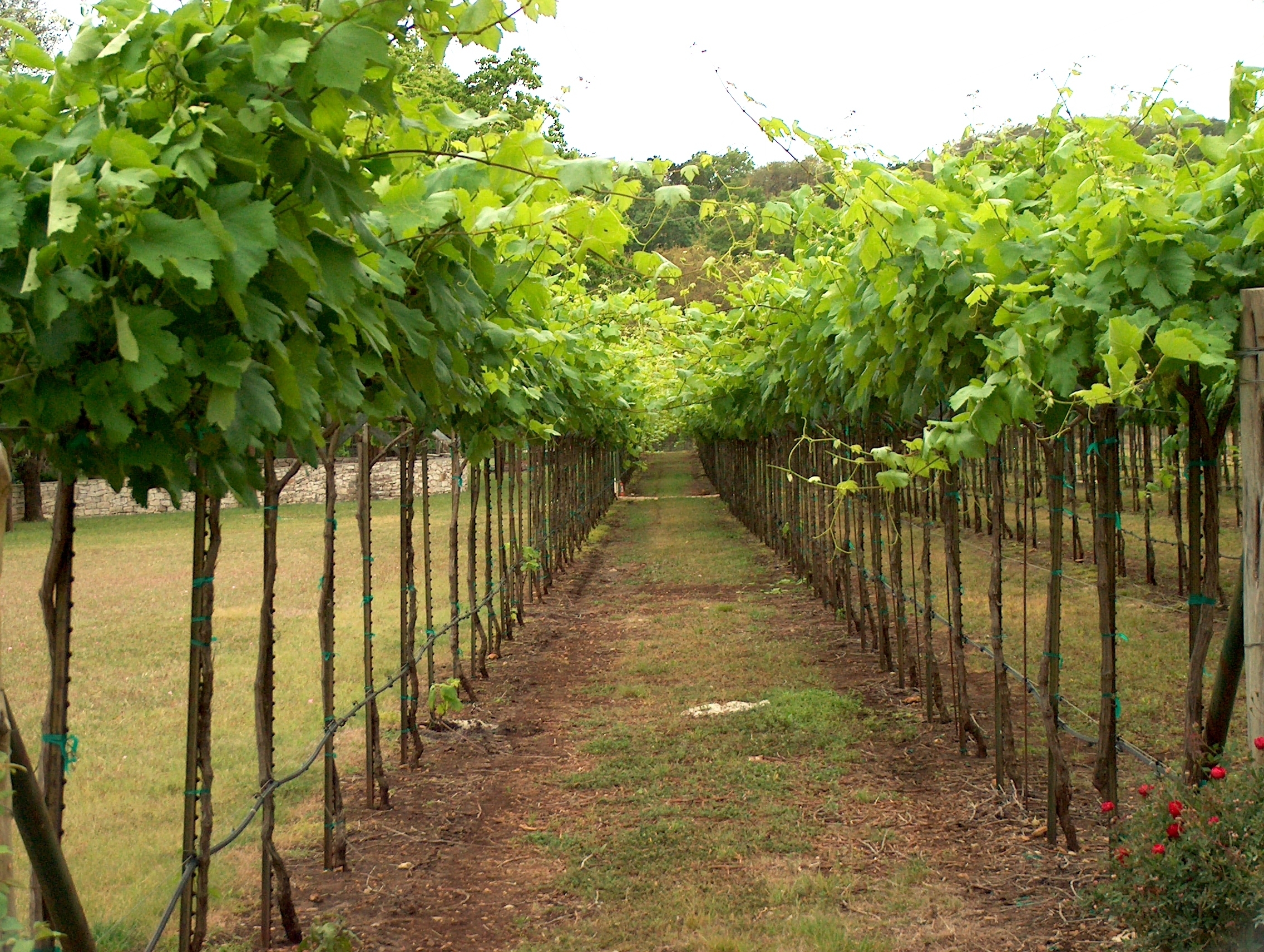Rossy Evelin Lima
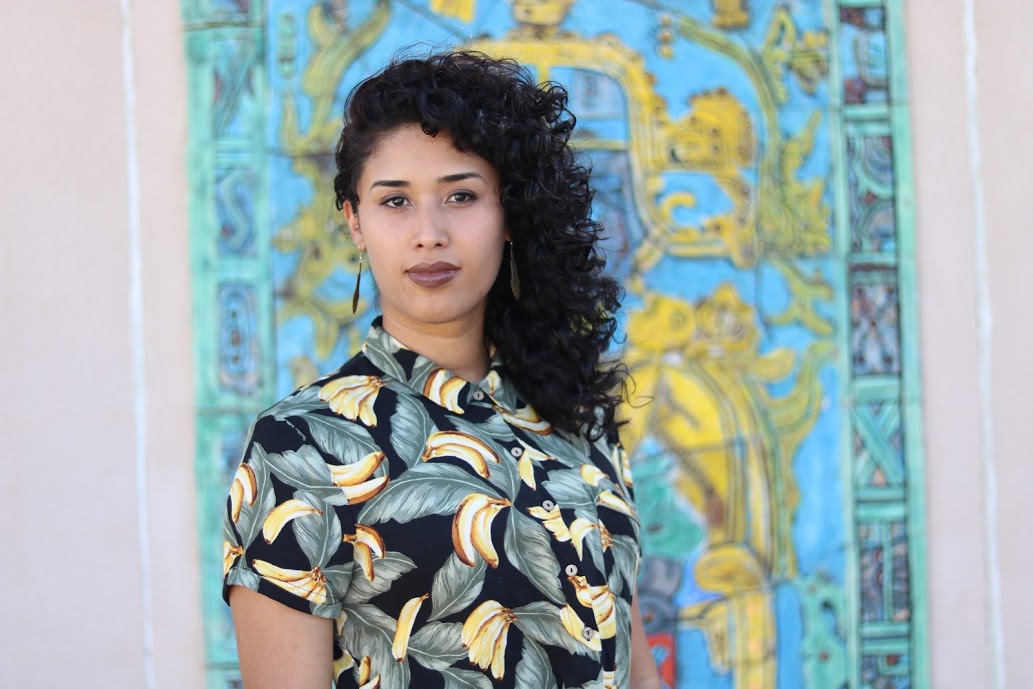
A POET’S JOURNEY, A WELL DOCUMENTED DREAM
By: Lilia Davis
Rossy Evelin Lima, Mexican poet, linguist and author, was one of the undocumented immigrants entitled to the benefits of DACA under President Obama, and who has succeeded as an international award winning poet. She has received one of the greatest recognitions within the United States, as Poet of the Year at The Americas Poetry Festival in New York, participating with 43 poets representing 18 countries and 7 languages, and awarded for her literary achievements. Her poetry reflects the dreams of her generation and a true spirit of the Americas.
A new voice in Hispanic literature
Previous to the Festival, Rossy has received other awards including the Gabriela Mistral Prize for the Hispanic Honor Society in the United States, and first place at International Contest La Finestra Etérea in Milan, Italy with her book of Poetry Migrare Mutare 2017 (Arte Poética press). She has published her work in numerous journals, magazines and anthologies in Spain, Italy, Canada, UK, United States, Mexico, Venezuela, Chile, Argentina and Colombia.
| Poetry calls for understanding and vision; in her work, the poet Rossy Lima proves her worth on both counts, understanding and dominating the material. Her poetic vision is clear, unadulterated, and, just as important, focused. I read her poems aloud and discovered a new voice in Hispanic literature. — Rolando Hinojosa Smith, world wide celebrated Mexican-American novelist and University of Texas professor, in praise of Rossy’s book, Ecos de Barro (Echoes of Clay). |
Rossy is an example of the perseverance often needed by many of us, someone that survived obstacles, demonstrating simultaneously that determination and obtaining an education can win out over adversity. This summer she fulfilled another dream when she earned a PhD in Linguistics from the University of Houston. A year ago I attempted to interview Rossy, and as you will see, I know now why I had to wait for this interview. Now she is ready to give an account of her journey as an undocumented immigrant who became an acclaimed poet from McAllen, Texas.
How she started her undocumented journey
I came to this country from Veracruz, México when I was just 13 years old crossing the border as an undocumented immigrant. I arrived with my mother, crossing the river with fear and with my pierced hands from so much pushing away thorns and branches.
I remember that I was very thirsty, and I had my eyes wide open, always. I remember fearing that my legs would fail, but the fear that my mother would be delayed because of me, fueled my strength to keep moving. I remember hearing the sound of the border patrol vehicle but we kept walking in a hurry without turning back, and that I felt my heart pumping all over my tired body. I wanted to stop and ask, why are we doing this? Why are we risking so much?
I don’t remember many parts of this journey, what I do remember is crawling out of the water, taking off my clothes to put on dry ones, but above all I remember running with an unknown path.
For many years after crossing the border, I felt that this event represented who I was. The stranger, the foreigner, the immigrant who does not belong. School was a new system for me, and it made me feel lonely and scared. I struggled to learn a new language to communicate, but my brain and my lips seemed disconnected, I murmured trembling words that my classmates and teachers could not understand.
Tired of being afraid
In my second year here, I was tired of being afraid. Afraid to go out and see a border patrol van. Afraid to make friends who might ask me how I got here. So I started writing poetry and that’s how I started to free myself, to vent these fears.
The difficult experiences I have faced as an undocumented immigrant have sometimes been terrible, frightening and painful. However, they have shaped what I am, and my experience as an immigrant writer.
I remember that in 8th grade, when I asked my teacher for tutoring after school, to help me pass the state exams. She replied, «Why do you want tutoring, if you barely know English?». As if I was wasting her time. At that moment I could not find the words to explain myself, but despite her explicit rejection, I could not accept a “no” for an answer. Not only did I stay for tutoring, but to my teacher’s surprise, I received one of the highest grades in reading and writing at school.
Poetry Unites
This event gave me confidence, and I started writing stories and poems. I explored my feelings about this new life and the nostalgia of my homeland. I continued working hard and I was able to achieve a good academic level. I had just finished high school and was beginning to regain a sense of satisfaction for the first time. I had a clear path. Until I tried to enroll in college.
I remember trying to explain the situation with trembling hands, as one employee after another at Pan American University told me that I could not enroll in the university because I was undocumented.
Once again my path became a border full of thorns and branches. Reminding me that I was still a foreigner, that I did not belong. I returned the next day, hoping they would see the urgency in my eyes and find a way to register me. A secretary made a call that day, and that changed my life. I was accepted at the university.
This event marked me as a writer. I started publishing my poetry in local and international magazines. But the most important thing is that in college, I started participating in advocacy groups to help people in my situation. I started to have an active role in a society where I had been invisible.
I developed a program in which we would go to secondary schools to promote education regardless of our legal status. This was my way of finding a purpose. And I discovered that we define who we are with our actions towards others and not with a label.
“Directing a program that serves Spanish speakers as a heritage language is a privilege that I treasure.”
After finishing my bachelors in Hispanic Literature, at University of Texas Pan American in Edinburg, Texas, I continued working a whole year without stopping to finish my masters in Literature and Linguistics. However, the dream of being a university professor pushed me to continue. I applied for a doctorate in Linguistics at the University of Houston. And I received the wonderful news that I had been accepted.
This was one of the happiest news I’ve received, but at the same time it was bittersweet as I was also informed that I had to take two classes at the Houston campus. I explained to my program advisor that I could not meet that requirement. I could not cross the immigration and customs checkpoint at Falfurrias Texas, because I was undocumented.
I explained to him that this immigration point 69 miles north of the border with Mexico, prevents people in my situation from going to another place besides south of Texas. He replied: «study hard, you do not have to worry about that now, just study».
And so I did, I dedicated my body and soul to my studies. But all this work was seemed in vain. I could not work as a professional. I would try to ease these feelings of confusion and frustration through my poetry: a place where I have always been free.
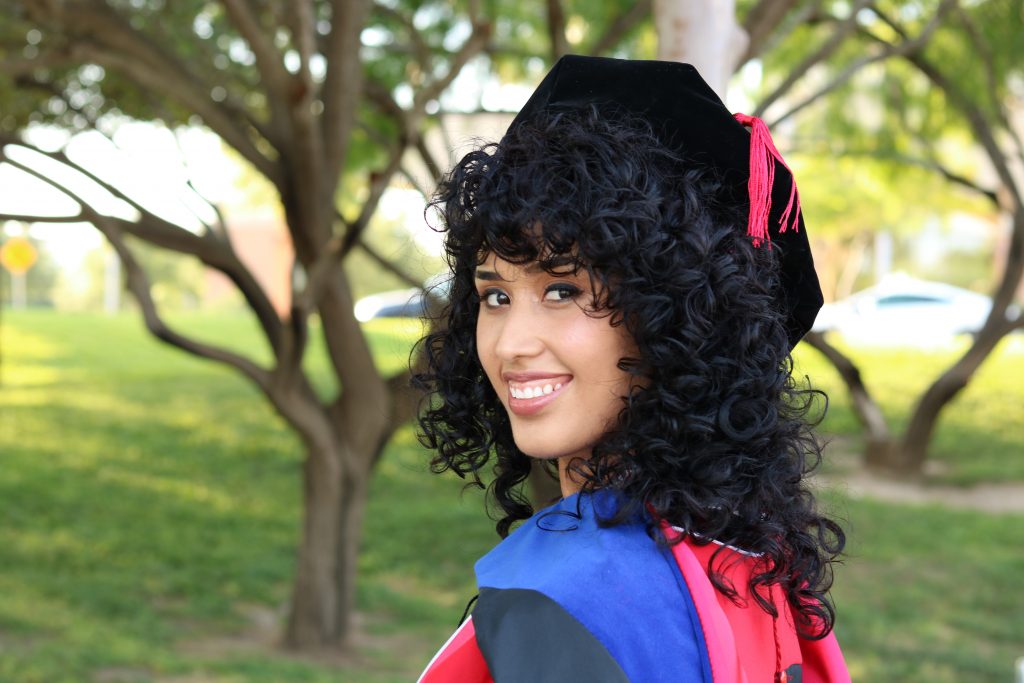 Just as I was about to give up, on June 2012, President Obama passed Deferred Action Childhood Arrivals for people who entered the country without documents as a child. A law that eliminated my fear of being deported and allowed me to work. That same year I started teaching at the university. And this summer, 2018, I can proudly say that I’m finally a doctor in Linguistics.
Just as I was about to give up, on June 2012, President Obama passed Deferred Action Childhood Arrivals for people who entered the country without documents as a child. A law that eliminated my fear of being deported and allowed me to work. That same year I started teaching at the university. And this summer, 2018, I can proudly say that I’m finally a doctor in Linguistics.
When I think back to the moment after crossing the river, I see my mother smiling at me while we both cry tears of hope, those tears that you shed when you take an important step, that step that marks your life. «Everything will be fine,» she told me. «Everything will be fine».
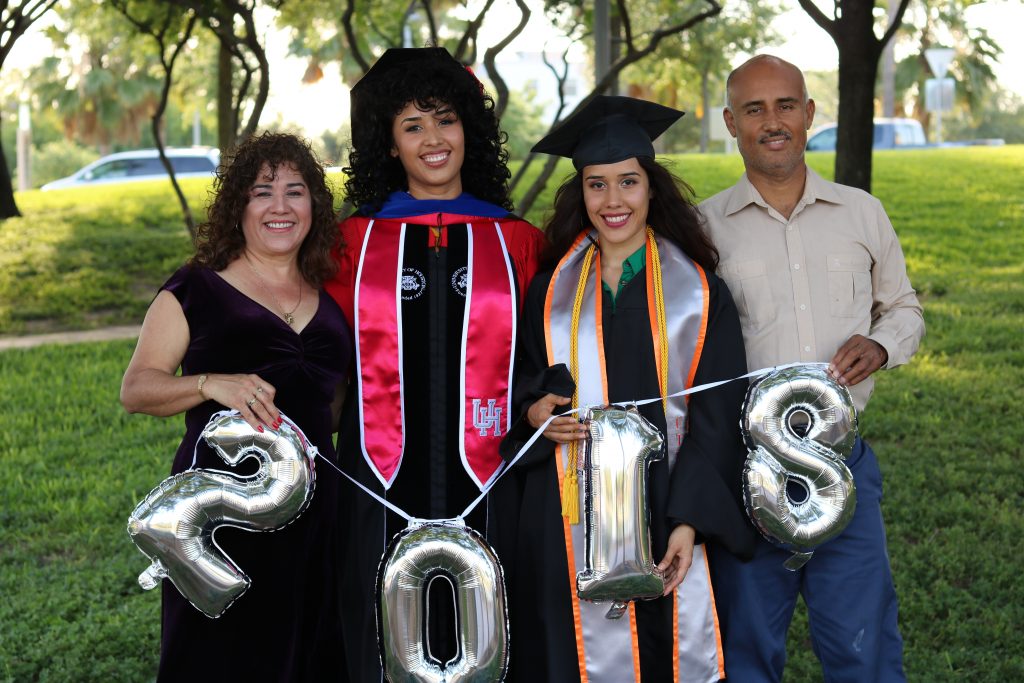
Rossy with her family at graduation
One piece of advice that Rossy wants to say:
«To the immigrants who come to this country carrying their dreams, to my DACA brothers and sisters, who struggle every day to nourish this country and the only home they know, I would tell them to keep their heads up.
It is very easy to fall into the vortex of the false words that despicable people use to describe us; in those moments we need to look inside ourselves, towards the voice of our ancestors that protects the truth in our hearts no matter where we go.
Know that we are people who came to this country to contribute, to make a change, to live fully looking for a better future. We also have to listen to the voice of our community, make sure to protect it and always seek the best for it, because if our community flourishes, we will flourish too.
I would also like to tell immigrants in the United States that we must take care of our physical and mental health. In the case of immigrants who have gone through situations of extreme danger, whether crossing the border or arriving in this country, we need to let out everything we have accumulated, what immerses us and makes us live with fear or resentment.
It is our duty to help immigrants in vulnerable ages, to understand that it is good to have the tide of emotions within our chests for what we have gone through, for our current reality, for the uncertainty of what is to come. I would ask children, youth and adults to write their stories and read it aloud, they will see that in doing so they will recognize the value of their own history, unique and at the same time very similar to the stories of others.”
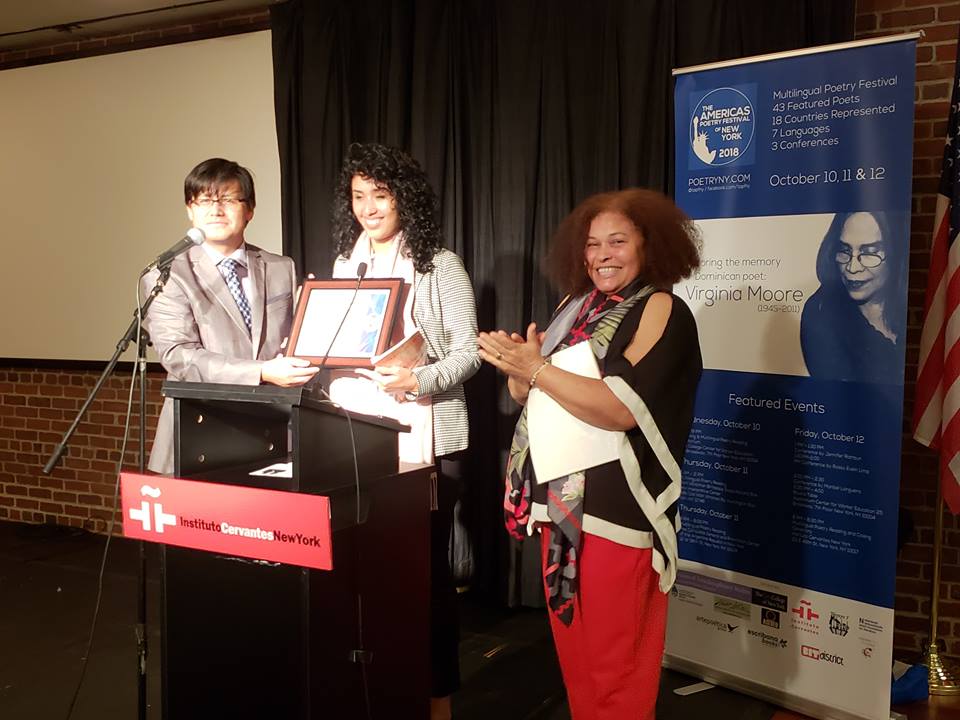 In October 12, 2018, Rossy was recognized as Poet of the Year by the Festival of the Americas in New York. «In recognition of her literary achievements and her poetry that reflects the dreams of her generation and the true spirit of the Américas”.
In October 12, 2018, Rossy was recognized as Poet of the Year by the Festival of the Americas in New York. «In recognition of her literary achievements and her poetry that reflects the dreams of her generation and the true spirit of the Américas”.
A memorial brick with the name of Rossy Evelin Lima will be placed in the Circle of Poetry located in the birthplace of the famous poet Walt Whitman in Huntington, Long Island. Now Rossy can proudly say that her’s will become a well documented dream.
Follow her on:
Facebook: @RossyEvelinLima
Web: https: www.rossylima.com

